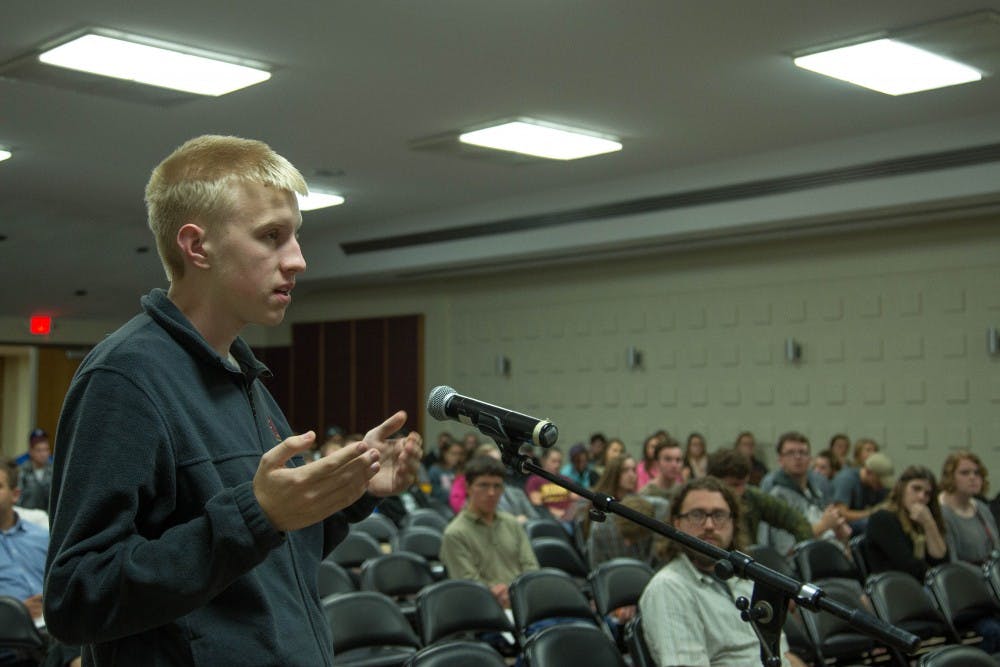Institutional racism, crime and voting discussed at Speak Up, Speak Out forum

Illinois freshman Paul Cappaert speaks during the Domestic Policy of the Candidates Event hold by Speak Up Speak Out, on Oct. 19 in the Bovee University CenteraAuditorium, Oct 19.
Nearly half of the students in the audience began filing out of the Bovee University Center Auditorium when institutional racism was brought up during the Speak Up, Speak Out forum Wednesday night.
The forum addressed Democratic presidential nominee Hillary Clinton and Republican presidential nominee Donald Trump's positions on crime, criminal justice reform, racial issues and economic policies.
Media platforms, voting and registration were also touched on by students and faculty. The panel included Donovan Watts, president of the political science honors fraternity Pi Sigma Alpha, Haven Taylor, social and criminal justice major; Lawrence Sych, political science professor, and Amanda Garrison, sociology professor.
Institutional racism
Halfway into the two-hour open forum, senior Jeremy Rodgers shifted the forum discussion to address racial issues. Before introducing the topic, he told the audience he was nervous and hoped they would stay patient with him as he articulated his thoughts on the issue.
"This is a difficult issue to talk about because it's so emotionally charged," he said. "I absolutely think that we need to be willing to discuss implicit bias and acknowledge that there is institutional racism in police departments across the country."
Though it's not true of all police departments, he said it's been found to be true in many of them.
"But, something else needs to be considered," Rodgers said before he began to share statistics from the Department of Justice. "From 1980 to 2013, African Americans make up about 13 percent of the population of the United States, but 52 percent of all homicides are actually committed by African Americans. Most of those are men, and they make up three percent of the United States."
He said in 2013 specifically, 38 percent of murders in the United States were committed by African American men ages 15 to 34.
The current issues America is facing today isn't the fault of African-Americans, but a deeper issue needs to be addressed, Rodgers said. He mentioned American economist Walter Williams pointed out that 70 percent of African-Americans today grew up in single-parent households.
Rodgers quoted his favorite economist, Williams:
"The welfare state has done to black Americans what slavery couldn't do, what Jim Crow couldn't do, what the harshest racism couldn't do, and that is to destroy the black family."
Although the numbers Rodgers gave are "the facts and should to be addressed," panelist Haven Taylor said she has a lot of problems with statistics.
"(Statistics) just do not show the whole picture," she said. "They are a very surface level way of understanding information and they leave out an entirety of the rest of the life of this person."
Amanda Garrison echoed Taylor's thoughts on statistics. Garrison referred to the Housing Act of 1949 which provided federal financing for urban renewal projects and extended federal money to build more than 800,000 public housing units.
Policies under this act didn't allow low-income married couples and their families to live in public housing, Garrison said.
"The policies enacted by the federal government made it impossible (for families) to stay together," she said. "In urban parts of the country like Detroit, St. Louis and Chicago, you have predominantly black populations living in the inner city because they can't but houses in the suburbs and they can't get out to these places where the better schools and sidewalks are."
She stressed that statistics report a moment, and not the history behind the issues at hand, such as the Housing Act.
"We have to question the Department of Justices' numbers when the policies that they practice are part of the problem," Garrison said.
Stop-and-frisk
Before the discussion began, the facilitator of the forum, sociology professor Liz Bradshaw showed a video clip of the presidential candidates answering questions about their views on crime and race.
The candidates never addressed or answered the questions they were asked, said panel member Donovan Watts. While Clinton talked about gun control, Trump addressed law and order and stop-and-frisk.
Stop-and-frisk is a practice in which police officers stop and question a pedestrian, then frisk them for weapons and other contraband.
"I'm not a huge fan of those tactics because they acknowledge implicit bias," Watts said.
The issue that struck Taylor in the video is when they were asked a question about race, both candidates talked about crime.
"Race isn't crime," Taylor said. "I encourage everyone to look at other things that affect race and that race affects such as immigration, economy, education, environment and crime. Crime is a small sliver they capitalize on with general statements."
Voting and registration
Senior Randi Cooper, the Jenison of activist group Register, Educate, Vote CMU spoke to the audience about registration and applying for absentee ballots.
Students registered to vote in their hometowns need to apply for an absentee ballot before they are able to vote in Mount Pleasant, Cooper said.
Applications for absentee ballots can be downloaded on vote.org or on the Michigan Secretary of State website. After receiving the ballot, it must be completed and returned to clerk's office by 8 p.m. on election day.



